Essential Oils for Anxiety: A Research-Based Holistic Approach
By Dr. Shubham Pandey +2 more

Get,

to manage your symptom
Get your,


4 Cr+ families
benefitted

OTP sent to 9988776655



You’ve successfully subscribed to receive
doctor-approved tips on
Whatsapp

Get ready to feel your best.

Hi There,
Download the PharmEasy App now!!


Register to Avail the Offer
Send OTPBy continuing, you agree with our Privacy Policy and Terms and Conditions

Hi There,
Sign up on PharmEasy now!!
Trusted by 4 crore+ families

OTP sent to 9988776655



You have unlocked 25% off on medicines




Code: NU25
By Dr. Shubham Pandey +2 more
Table of Contents
Anxiety touches millions globally. It hits everyday life and overall health hard. Lately, there’s been a surge in interest in holistic ways to manage anxiety. One such approach is using essential oils. These natural extracts have been around for ages and studies have reported their use in promoting relaxation, balancing emotions, and enhancing mental wellbeing.
In this blog, we are going to dig into the world of essential oils. We will discuss the evidence backed role of essential oils in easing anxiety. Also, we’ll talk about how you can use essential oils effectively and share some safety tips too.
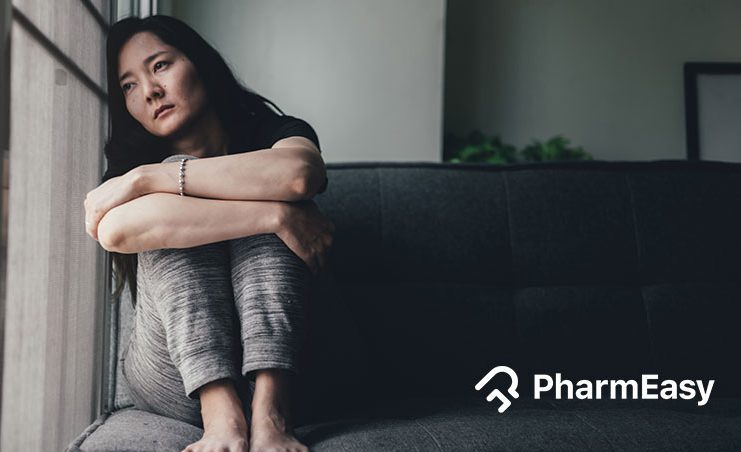
Essential oils are nature’s gift. They’re extracted from different parts of plants using methods such as distillation or cold pressing. These oils have properties that can potentially shift our emotions, and mood, and bring an overall sense of well-being.
Essential oils are super concentrated, unstable compounds derived from plants. The specific plant part collected varies depending on the oil. This can include flowers, leaves, roots, and bark. People love these oils because they smell nice. Also, they have reported health benefits like reducing stress and pain, improving sleep, and boosting mood.
We can extract essential oils in a few ways. The most common techniques are steam distillation and cold pressing. Each has its own pros and cons. The choice depends on the type of plant, oil yield, and purity wanted.
What is aromatherapy? It’s a healing treatment that uses natural plant extracts, including essential oils, aiming to improve overall health and well-being. Here, smelling plays a vital role. Why? Because it links straightaway to our brain part that handles emotions, memories, and learning – the limbic system. When we sniff an essential oil, its particles mingle with our olfactory or smell system and send signals to our brain that might change our mood and emotional state. Isn’t that fascinating36?
Lots of essential oils have compounds that may shift our mood. Some oils are calming, making us feel still. Others might stimulate us lightly to boost energy and focus. By picking certain essential oils based on their properties, we can potentially influence our emotions. This way, we can become good at handling anxiety.
The chemical makeup of essential oils can vary a lot. This depends on the plant’s source and extraction method. Many essential oils have active compounds that add to their scent, taste, and healing properties. Some compounds, like linalool in lavender or limonene in citrus oils, may interact with our nervous system and help guide our moods and emotions.
There is research backing the anxiety-reducing properties of some essential oils, some studies11 have shown positive links between using specific essential oils and lesser anxiety symptoms, however, more large-scale human studies are needed to confirm these benefits. These oils can be used in addition to the prescribed treatment and therapy for anxiety management and should never be used to replace an existing treatment. The following essential oils have been found to be helpful for people dealing with anxiety issues-
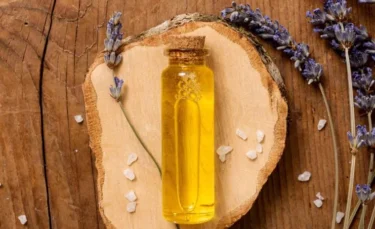
The lavender essential oil comes from the flowers of the Lavandula angustifolia plant. Its scent is sweet and floral and it’s popular for its comforting effects. A good number of studies3 have shown that the fragrance of lavender essential oil may lower anxiety, improve sleep, and create a sense of calm. It may be beneficial for people with general anxiety issues, sleep disorders, and stress25.
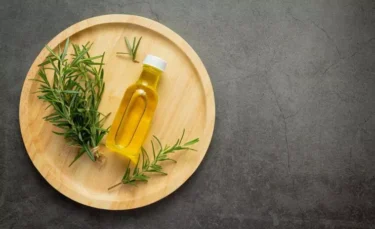
Rose essential oil comes from the petals of Rosa damascena and other rose species. Its aroma is rich and floral. People know it for its soothing properties. It’s been found to help ease anxiety and blues. In one study9, females undergoing painful medical procedures felt less pain and anxiety after a belly massage using rose essential oil22.
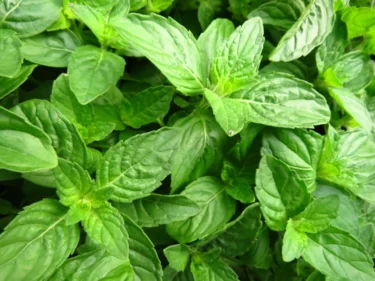
Sweet basil essential oil comes from the leaves of the Ocimum basilicum plant. It smells spicy and herbal6. It’s believed to help relax the mind and ease stress. Although research10 on sweet basil essential oil is limited, some animal studies5 show that it may soothe and make the nervous system drowsy. More research is needed to confirm its full potential for easing anxiety in humans.
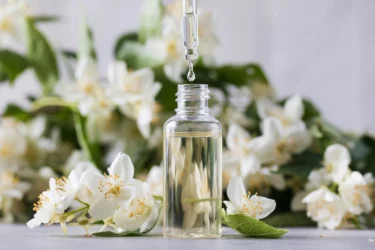
Jasmine essential oil comes from the flowers of the Jasminum grandiflorum plant. It has a sweet, exotic aroma and is often used in perfumes and cosmetics for its uplifting scent. According to a small study4, sniffing jasmine essential oil can affect our central nervous system to lift mood and lower anxiety or stress levels.
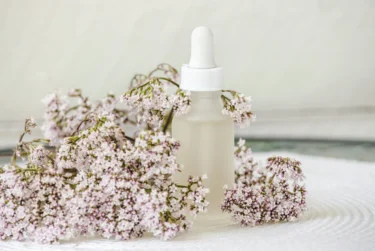
Valerian essential oil is made from the roots of the Valeriana officinalis plant. Its scent is earthy and woody. Not everyone may like it, but it’s valued for its calming effects. Studies suggest that valerian essential oil can help improve sleep quality, easing anxiety, and creating comfort. People with sleep disorders and anxiety-bound problems find it to be useful1.
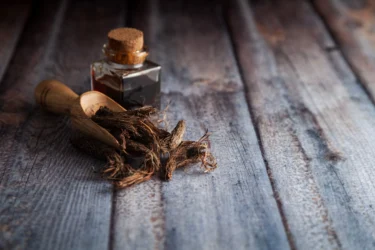
Also known as spikenard, Jatamansi essential oil comes from the roots of the Nardostachys Jatamansi plant. It has a warm, earthy scent and has been used in Ayurvedic medicine to keep the mind calm and help with sleep. Although studies2 on Jatamansi essential oil and anxiety are limited, some animal studies feature that Jatamansi extract has high anti-anxiety effects. This may work through the gamma-aminobutyric acid (GABA) pathway.
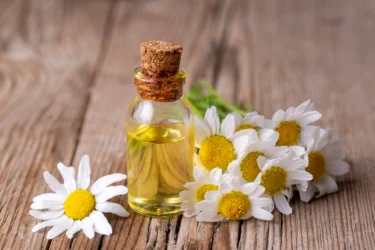
Chamomile essential oil comes from the flowers of the Matricaria chamomilla plant. It’s known for its comforting, calming features to ease anxiety and promote comfort for centuries31. Research7 also suggests that chamomile add-ons can help ease anxiety symptoms in people with mild to moderate anxiety issues.
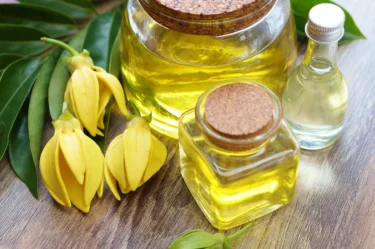
Ylang-ylang essential oil comes from the flowers of the Cananga odorata tree. Its scent is sweet and floral, thought to be uplifting and aphrodisiac. However scientific proof is limited, but traditionally the ylang-ylang essential oil is believed to help lower stress and anxiety and improve overall mood30.
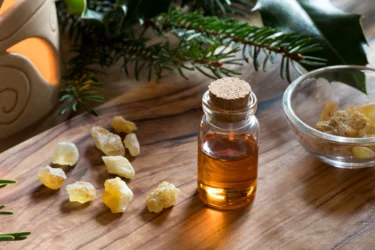
Frankincense essential oil comes from the resin of the Boswellia tree. Its aroma is musky and sweet and people often use it in meditation and spiritual practices to keep calm. Some studies hint that rubbing frankincense essential oil can bring down stress levels and improve anxiety signs12.
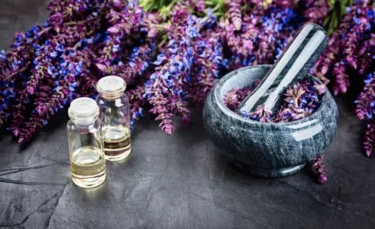
Clary sage essential oil comes from the leaves of the Salvia sclarea plant. It’s loved for its warm, relaxing features and is thought to work great at easing stress and tension. While there’s limited research on clary sage essential oil and anxiety, a small study24 found that sniffing clary sage oil resulted in less stress and more feelings of wellness and comfort.
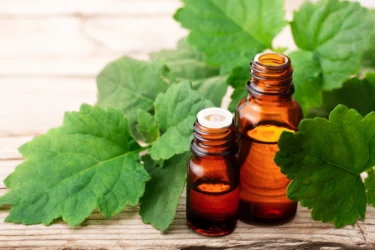
Patchouli essential oil comes from the leaves of the Pogostemon cablin plant. It has a warm, earthy scent that was used in the past to provide calm and comfort. People report that patchouli essential oil can lessen stress and anxiety20. But we need more research to affirm this.
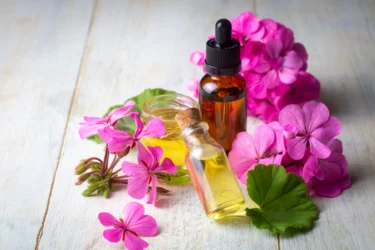
The geranium essential oil comes from the leaves and stems of the Pelargonium graveolens plant. Its scent is sweet, and floral, and is often used in aromatherapy. It can help keep emotions in balance and diminish anxiety16. Some studies15 have found that sniffing geranium essential oil may lower anxiety levels and provide a soothing, calming effect.
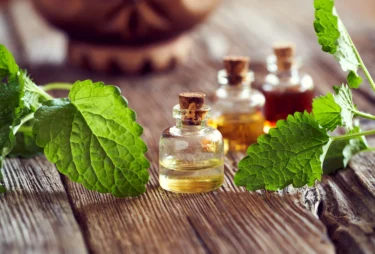
Lemon balm essential oil comes from the leaves of the Melissa officinalis plant. Its scent is fresh, citrus-like that’s thought to uplift the mood, which may also lessen the feelings of stress and anxiety17. While research on lemon balm essential oil and anxiety is limited, some reports suggest that it might have a mild comforting effect and help lift the overall mood18.
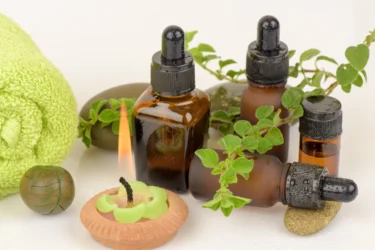
Sweet marjoram essential oil comes from the flowers and leaves of the Origanum majorana plant. It carries a warm, herby aroma that’s thought to provide soothing and calming benefits. While science is still looking into this, people say that sweet marjoram essential oil helps lessen anxiety, and puts one at rest19.
Besides the above-stated essential oils with the most evidence of anxiety-easing properties, some other oils also deserve a mention.
Although essential oils have been shown to be beneficial in easing anxiety, it is sometimes necessary to take medical help for anxiety issues. A counselor or a psychiatrist can guide you best in devising a management plan for your anxiety based on your underlying mental condition and needs.
You can use essential oils to reduce anxiety in many ways as per your liking. Let’s talk about some popular methods to make the most of essential oils in your daily routine.
One of the easiest and most effective ways to use essential oils is with aromatherapy8,14. You diffuse the oils in the air using a gadget called a diffuser. This lets you breathe in their healing properties and enjoy their calming effects.
There are different kinds of diffusers in the market, from simple reed diffusers to high-tech devices that produce a fine mist of essential oils. When picking a diffuser, think about things like how easy it is to use, area coverage, and noise level.
Another way to use essential oils reduce anxiety is by putting them onto your skin. You can dilute them with carrier oils like almond, coconut or jojoba oil and directly apply on the skin. Some essential oils can be kneaded into the skin or even added to a hot bath to reap the benefit of their calming effects.
Note that it’s crucial always to dilute essential oils before applying them to your skin to prevent skin itchiness, burns, or unique reactions29. You should follow the guidelines provided by the essential oil maker or ask a professional aromatherapist to guide on correct dilution ratios.
When using essential oils topically, target pulse points like your wrists, temples and the back of your neck. These areas have better absorption because they’re close to blood vessels and when the oil is applied to them it warms up faster, facilitating its diffusion into the skin.
Sneaking in the scent of essential oils directly from the bottle or by putting a few drops on a tissue or cotton ball can also be quite relaxing. When anxiety strikes, this may offer immediate relief and help keep the mind calm.
To breathe in essential oils on the move, put a few drops on a cotton ball or nasal inhaler, and take slow, deep breaths. This method can be handy during high-stress moments or bouts of anxiety.
You can also bring essential oils into your environment by means of scented jewelry, air fresheners, or adding a few drops to a hot water bowl, or a humidifier. This way, you wrap yourself with the calming aroma of the essential oils all day long.
For the best results, you may consider adding essential oils to your daily rest routine along with other potential stress-relief techniques. Some examples include:
Also Read: What Is The Link Between Diet And Mental Illness?
While essential oils can provide many benefits in easing anxiety, it’s important to be aware of the linked risks and precautions. This ensures safe use:
Before beginning with a new essential oil, it is important to do a patch test. This makes sure you don’t get an allergic reaction33. How to do it? Apply a small amount of diluted essential oil to a quiet area of skin (like the inner elbow). Then wait 24 hours to see any reactions. If redness, itch or swelling occur, stop using the essential oil. Also, reach out to a healthcare provider.
Store essential oils in a cool, dark place away from sunlight and heat. Keep the bottles tightly closed to prevent loss due to evaporation and decay. Be aware of expiration dates, as essential oils can lose effectiveness with time.
If you see signs of a bad reaction to an essential oil, such as rash, itching, breathing trouble, or face or mouth swelling, get medical help at once. Also, if you keep struggling with anxiety and it affects your daily life, reach out to a healthcare provider. A professional can provide guidance and additional treatment options.
Also Read: Overthinking – To What Extent Can It Damage Your Life?
Essential oils potentially offer a natural, holistic way to manage anxiety, keep calm, and improve sleep quality. By understanding the properties of various essential oils and how they work with our nervous system, we can tap into their healing potential and incorporate them into our daily routines for their calming effects. Remember to reach out to a qualified aromatherapist or healthcare provider if you are unsure about using essential oils. Anxiety and sleep disorders need to be diagnosed and treated by a psychiatrist. Do not consider essential oil use as a replacement for treatment prescribed by your doctor. Do not use essential oils without consulting an expert if you are pregnant, nursing, or have a health condition. Also, it’s best to consult your doctor for additional measures that can help you deal better with your anxiety issues.
Also Read: Natural Home Remedies for Anxiety
Some of the top essential oils that possibly ease anxiety include lavender, rose, sweet basil, jasmine, valerian, and chamomile. You may try different oils until you find the ones that suit you best.
While essential oils may help with passing anxiousness and provide some relief during a panic attack, they aren’t a cure. If you’ve been diagnosed with an anxiety disorder or have chronic panic attacks, it’s key to seek help from a healthcare provider for appropriate treatment and management.
Always dilute essential oils in a carrier oil before putting them on your skin, and never ingest essential oils. To use essential oils for easing anxiety, you can diffuse them in the air, put them topically to pulse points, or inhale them directly from a cotton ball or tissue.
Some individuals may get skin itchiness or an allergic reaction when using essential oils, so it’s key to test for allergies before using any new essential oil. If you see redness, itching, or swelling after using an essential oil, stop using it and get in touch with a healthcare provider.
If you are thinking about adding essential oils to your daily rest routine, you can use methods like diffusion, topical application, or inhalation. Also, you may combine essential oils with other relaxation methods such as deep breathing exercises, self-massage, and mindful meditation, for optimal anxiety relief. It is important to consult a psychiatrist for the treatment of anxiety disorders. Remember to consult a qualified aromatherapist or healthcare provider if you have any doubts about using essential oils. It’s particularly important if you are pregnant, nursing, or have a health condition.
Disclaimer: The information provided here is for educational/awareness purposes only and is not intended to be a substitute for medical treatment by a healthcare professional and should not be relied upon to diagnose or treat any medical condition. The reader should consult a registered medical practitioner to determine the appropriateness of the information and before consuming any medication. PharmEasy does not provide any guarantee or warranty (express or implied) regarding the accuracy, adequacy, completeness, legality, reliability or usefulness of the information; and disclaims any liability arising thereof.
Links and product recommendations in the information provided here are advertisements of third-party products available on the website. PharmEasy does not make any representation on the accuracy or suitability of such products/services. Advertisements do not influence the editorial decisions or content. The information in this blog is subject to change without notice. The authors and administrators reserve the right to modify, add, or remove content without notification. It is your responsibility to review this disclaimer regularly for any changes.
Comments

Leave your comment...
You may also like
Comments